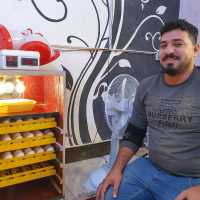In areas of southern Iraq, where unemployment is high and opportunities few, there is plenty of open lands. Climate change and low water levels in rivers have made traditional farming a challenge, but for those willing to try other modes of farming, there is hope. Here is a note from the field.
In Iraq, chicken farms are successful economic projects that provide support to a weak economy, expand job opportunities, and reduce dependence on imported food.
Kadhim, 28 years old and a graduate of an agriculture college, now runs a small poultry farm to support his family.
When we provided the start-up funds for Kadim to set up a farm, he used the money to get an egg hatching machine, poultry farming instruments, and enough feed for three months—so he could immediately start working on his land and preparing it to raise chickens. His farm is already productive: Kadhim collects more than 250 eggs per day, and he is reinvesting into his business through the hatchery machine, to get more chickens at the best price.

We first met Kadhim at the peaceful protests of young graduates, looking to bring the government’s attention to the serious problem of unemployment. He was unemployed himself and participated in daily sit-ins demanding the local government provide job opportunities in the depressed economy. Kadhim was very sad and said “time will pass without being offered anything for our future, or for our families who suffer from poverty. We cannot provide for our simplest needs, and suffer a lot to send our children to school.”
Offering Kadhim the chance to start a business allowed him the kind of opportunity he didn’t think was possible.

Despite being in a fairly large family of seven, Kadhim doesn’t have debts that affect his business. So within a few months of starting the project, Kadhim was already able to hatch and sell ornamental birds and purchase more chickens for their eggs.
He quickly grew his flock to 300 chickens, which delivered 250 eggs each day, and his weekly income was $190—which is enough to provide for essential needs. But Kadhim wants more. He is focused on growing his business. He has the necessary experience and motivation and knows this business will provide him with enough income to take care of the needs of his family.

Fakhry, 45 years old, lives with his family in a small house in the countryside. He has three children, and he helps care for his mother who is battling cancer.
Fakhry used to be a laborer, picking up jobs wherever he could all over Iraq because there are few job opportunities in his city. He spent all his time far from his family, and his income was so little—not more than $30 per week. He considered joining a local militia for money, to help his family and his mother.
Fakhry said, “I learned a lot from working in different cities. I learned to raise livestock, poultry, fish, egg production, and make egg hatching machines—but I was not able to profit financially from all this experience. All the money I earned went to take care of my family. I am the only one who can work, and sometimes I have a hard time providing treatment for my mother.”

One of the local activists who provide free medical treatments to vulnerable families told us that Fakhry and his family needed help. So we reached out, he told us his story, and he told us about his dream to start a business raising fish.
This is a hard business to get into in southern Iraq. The work needs a lot of experience and caution, to prevent the kinds of mistakes that lead to total failure. But Fakhry was confident in his experience and was able to successfully create a thriving fish pond in an otherwise ordinary field.
Fakhry says, “This project will help me to settle down and work near my family. The vulnerable families in the village where I live can’t afford to buy fish because the prices are so high. Now they’ll have the chance to get good, healthy fish at an appropriate price.

Fakhry waited for the fish to grow to an appropriate weight and then sold every fish. Even the water from the fish pond is a good organic fertilizer, which he made use of.
Fakhry hopes to make a good profit after selling his fish and has plans to make a second pond where he’ll share his experience with others who want to raise fish.
Chicken and fish are two staples of the Iraqi diet, always in high demand. Encouragement and the lack of small business start-up funds was the only thing keeping these men out of the marketplace and unable to provide for their families. Our Preemptive Love community filled that gap, and we would love to do the same for many more families.


